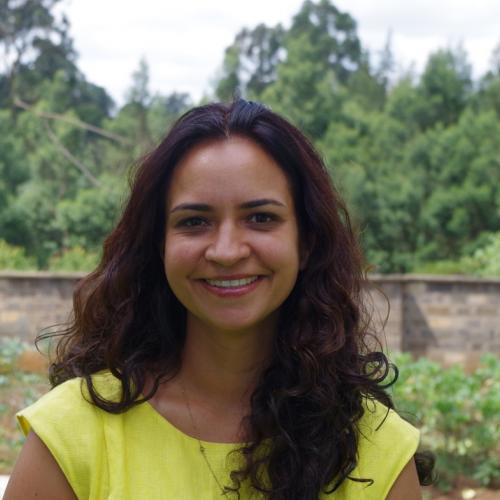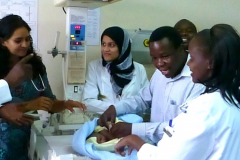- Overview
-
My research focus has very much been defined by my concern in (1) addressing inequities in care, (2) engaging young people in the process of addressing these, (3) and mentoring a research team in design-thinking principles. To carry this out, I co-founded the AMPATH MNCH Innovations Team in 2014 at Moi University in Kenya. Together, we are a multidisciplinary and multinational group of 30 people, drawing from the fields of OB/GYN, Anthropology, Midwifery, Nursing, Data Science, Pharmacy, Public Health and Business Management. AMPATH is a unique collaboration in global health, committed to developing excellence and leadership capacity in research, education and care in Kenya. In ‘Leading with Care’, our focus has been to layer research onto care initiatives. Broadly, our research projects focus on Access to Care, Maternal/Infant Mortality, Diagnostics and Community Engagement.
- Publications
-
Risk of Dysglycemia in Pregnancy amongst Kenyan Women with HIV Infection: A Nested Case-Control Analysis from the STRiDE Study
Journal of Diabetes Research
Sonak D. Pastakia and Wycliffe K. Kosgei and Astrid Christoffersen-Deb and Benson Kiragu and John N. Hector and Gertrude Anusu and Ponnusamy Saravanan
DOI: 10.1155/2021/8830048
04/2021 - Research
-
Malezi Mema: Building Adult Capabilities to Safeguard Children's Developmental Potential
Worldwide, women and children in poor and rural communities face the challenges of pregnancy and infancy without supportive relationships in the home or community. Children growing up in these environments often face the toxic stresses of Maternal Death and Disability, Poverty, Violence and Neglect. These stresses have been shown to stunt child growth and development and place children and adolescents at risk of further social and economic disparities. These toxic stresses also present numerous challenges to parents who may rely on harsh punishment to parent their children. These conditions help to sustain the vertical transmission of poverty, unmet potential and poor health from one generation to another.
To disrupt this intergenerational cycle, we integrated a parenting curriculum into the already existing Chamas (women’s groups), which are peer support groups that we have shown to be very successful in improving medical, social and financial health of pregnant women. Building on this success, we partnered with the South African based Sinovuyo Caring Families Programme to adapt a positive parenting programme. We named it MaleziMema, which means ‘Good Parenting. The program targets parents of children under 5 years who are at risk. In 2015, we delivered this parenting programme to 613 mothers and their children living in poor and rural communities in Western Kenya.
We found that chamas can be used as a platform to build adult parenting capabilities and to safeguard children’s developmental potential in communities where they are otherwise at risk of not meeting their potential. In addition to improving health services utilization, financial literacy, income generation and decreasing childhood illness, we found that children of mothers attending the program were 30% less likely to be punished harshly. In addition, attitudes towards punishment differed between those in the program and those not. Furthermore, we showed that women attending the program had reduced parental stress by 22%. We know that these are all intermediate measures that can lead to increasing toxic stress within homes and negatively affecting child development. We are currently in the process of planning a cluster RCT of this intervention.STRIDE – STratification of Risk of Diabetes in Early Pregnancy in India and Kenya
The prevalence of diabetes mellitus (DM) is increasing worldwide and even more so in developing countries such as Kenya. The aim of the study is to determine the prevalence of GDM in a rural and urban Kenyan population, develop an accurate clinical risk scoring tool based on easily obtainable risk factors to stratify women at risk of GDM in this population, and determine if a selective screening strategy would be cost-effective in Kenya.
Launched in May 2016, we are carrying out a prospective cohort study recruiting eligible pregnant women who are under 20 weeks gestation attending antenatal care at health care facilities within Uasin Gishu county. Through early identification, we hope to reduce the risk of the development of GDM and related maternal complications, the risk of adverse fetal programming due to hyperglycemia, and ultimately reduce the future metabolic risk of the mother and offspring.Chamas for Change: a Cluster RCT in Trans-Nzoia county, Kenya to validate community-based peer support mechanisms during pregnancy and early childhood
Improving access to care and encouraging health seeking behavior through peer support groups and financial empowerment can improve the outcomes related to pregnancy and childbirth. Chama cha MamaToto (chamas) is a peer-support model that groups together pregnant women in the same community. Translated from kiswahili as ‘groups’, chamas have a longstanding presence in East Africa. Using this existing cultural script, we have developed chamas tailored to the needs of pregnant women. Central to our approach is the integration of health, social and financial literacy education with a savings/loans program. The objective of the study is to demonstrate that chamas are an effective service-delivery platform for improving women’s and children’s health, women’s sense of peer support, women’s empowerment and women’s financial well-being in western Kenya.
To assess impact, a cluster randomized control trial of the intervention is taking place in 37 community units and 40 community units for control in 2018-19.Grants2016 - 2018 Principal Investigator. Chamas for Change
Validating an integrated community-based strategy of peer support in pregnancy and infancy, Grand Challenges Canada. 250,000 CAD. [Grants] $250 000 over 24 months.
2014 - 2016 Co-Investigator. LEEPing Ahead
See and LEEP Training for Primary Care Providers in Kenya, CFAR supplement. Collaborator(s)
Cu-Uvin, S. Omenge, E. (500 000 $ over 24 months)
2015 - 2018 Co-Investigator. STRIDE – STratification of Risk of Diabetes in Early Pregnancy in India and Kenya, MRC Newton Fund. Collaborator(s)
S Pastakia, W. Kosgei. (£600,567 over 3 years)
2015 - 2016 Principal Investigator. Chamas for Change
Building Adult Capabilities to Safeguard Children’s Developmental Potential through Mother-Child Clubs in Kenya, Grand Challenges Canada. Collaborator(s)
SL. Ruhl, L ($250,000 over 18 months)
Honours & Awards2011 Rising Star in Global Health, Grand Challenges Canada
Women in Science: Dr. Astrid Christoffersen-Deb
Dr. Astrid Christoffersen-Deb is a panellist at this year's Women in Science event. She shares how attending an all-girls Catholic elementary and high school nurtured her confidence, interests and sense of service, leading her to focus on the health of newborns, pregnant women and new mothers locally and abroad.






